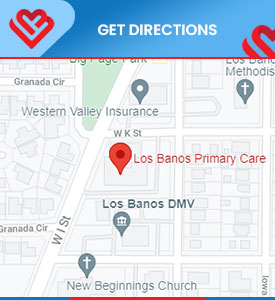Dehydration Treatment Specialist in Los Banos, CA
A study suggests that even if human body loses 1.5% of water, it starts showing symptoms ranging from mild to severe. Severe dehydration causes different health issues such as dizziness, headache, tiredness, dry mouth, lips and eyes, peeing less often than usual and tiredness. Dr. Raminder Mand, MD, is our primary care specialist at Los Banos Primary. Having extensive experience and education, she provides effective treatment for dehydration at Los Banos Primary Care. For more information, contact us or book an appointment, or simply walk-in to 1120 West I Street, Suite#B, Los Banos, CA 93635.


Table of Contents:
What is dehydration?
How does dehydration develop?
What are the signs of severe dehydration?
When should you go to primary care for dehydration?
Dehydration is caused by an inadequate amount of water and other fluids being present in the body for it to function normally and is, therefore, a potentially serious condition. Dehydration happens simply when either the body is losing more fluid, or from not having enough water in the body. Dehydration can affect people of any and all ages, although it is particularly dangerous for older adults and young children. In young children, dehydration is usually the result of vomiting and severe diarrhea.
For older adults, dehydration occurs as the result of their bodies having a naturally lower volume of water. However, their likelihood of dehydration can increase due to medications that they take or medical conditions like diabetes. Older adults need to be mindful at all times of their water intake as a minor illness such as a lung or bladder infection can easily cause dehydration.
Warm temperatures and rigorous physical activities can increase the likelihood of developing dehydration for people of all ages, especially when they aren’t drinking enough water. For the most part, mild to moderate dehydration can be treated by an intake of extra fluids. Severe dehydration, however, requires immediate medical attention and preventive care in order to get adequate fluids into the body and monitor for symptoms of more serious conditions due to dehydration.
Dehydration isn’t intentional as it can easily develop for many reasons, with an increased risk in certain circumstances. Failing to drink enough water on a regular basis is the most common reason for dehydration. Travelers and hikers can often experience dehydration if they don’t plan ahead and bring clean, safe drinking water with them. Some medical conditions can also cause your body to lose water faster than normal, leading to dehydration. Vomiting and diarrhea cause the body to lose more water than normal, as does a fever, in particular high fevers.
Sweating is our body’s way of cooling down whether it’s from exercise, physical exertion, or hot weather, however that means our bodies lose more water than normal. People who are sweating more than normal will need to increase their water consumption to offset the extra water loss. Medical conditions such as diabetes, or certain medications, can cause increased urination that uses more water than normal, so water intake needs to be closely monitored and increased.
Not all signs and symptoms of dehydration are the same, as adults experience different symptoms than young children. While many people think feeling thirsty is a sign that they could be getting dehydrated, it actually means that they are already suffering from dehydration. For infants and young children, the common symptoms of severe dehydration are dry tongue and inside of the mouth, crying without tears, three hours or more with no wetness in a diaper, sunken looking eyes and cheeks, sunken soft spot on the top of the skull and appearing listless or irritable.
For adults of all ages, the symptoms of dehydration include extreme thirst, dark-colored urine, fatigue, dizziness, and confusion. Some people may experience additional symptoms of low blood pressure, increased heart rate, and reduced blood flow going out to their extremities. Primary care physicians can usually diagnose dehydration from the symptoms alone, however, they can choose to perform a blood or urine test to pinpoint how severe the dehydration is. These tests can also be used as indicators of other health concerns caused by dehydration such as a urinary tract infection or kidney issues.
Severe cases of dehydration will require primary care and medical attention, especially if they are affecting the individual’s ability to function. Severe dehydration symptoms include the patient being irritable or disoriented, unable to keep fluids down, having bloody or black stools, or if they have had diarrhea for 24 hours or more, and medical attention should be sought out immediately.
When it comes to young children and infants, it is often safer to err on the side of caution to get them checked out by a doctor if dehydration is suspected to ensure their bodies get the fluid they need right away. If you are experiencing symptoms of dehydration, immediately start drinking water and seek medical attention. Do not ignore serious symptoms of dehydration, call us or book an appointment, or find us at 1120 West I Street, Suite#B, Los Banos, CA 93635. We serve patients from Los Banos CA, Volta CA, Santa Nella CA, and Trent CA.
Check Out Our 5 Star Reviews








